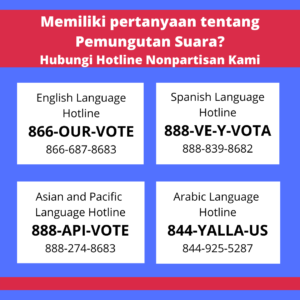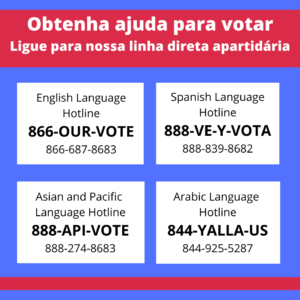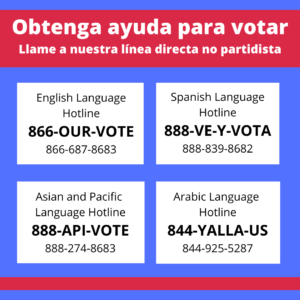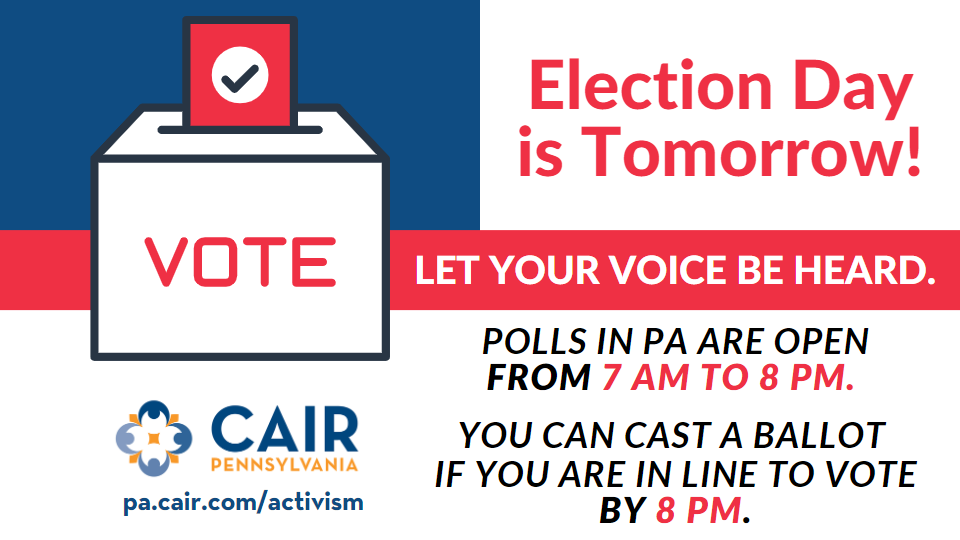Tomorrow, Tuesday, Nov. 8, is the midterm election and CAIR-Pennsylvania is urging all American Muslims to make a plan to vote on election day.
1. Check your polling station.
2. Did you vote by mail? Check the status of your ballot.
(Please note that so far, Philadelphia and Allegheny counties have published lists of voters whose mail-ballots have issues. Please check the links to see if your name is on the list.)
3. Make sure on election day you protect your right to the ballot box and do not be swayed.
Check pa.cair.com/activism for multilingual election day helpline information.












4. Here are some important tips regarding voter rights in Pennsylvania:
- Only first-time voters, or those voting for the first time in a new precinct, must show ID. Acceptable ID includes both photo and non-photo ID. Registered first-time voters who do not bring ID to the polls can return with identification or must be offered a provisional ballot.
- Voters who applied for and received a mail ballot and then decide they want to vote at the polls must bring their mail ballot packet with them to be voided.
- If a voter applied for a mail ballot but did not return it and no longer has the mail ballot and envelopes, they may vote by provisional ballot at their polling place on Election Day. Their county board of elections will then verify that they did not vote by mail before counting their provisional ballot.
- If a voter applied for a mail ballot but never received it, they should vote by provisional ballot at the polls on Election Day. Their county board of elections will then verify that they did not vote by mail before counting their provisional ballot.
- If a voter’s name is not in the poll book, poll workers can call the County Board of Elections to see if the voter is registered in another precinct in the county. Registered voters who are in the wrong precinct polling place should go to the correct polling place to vote, but a voter who believes he or she is registered in the precinct and should be listed in the poll book is entitled to cast a provisional ballot.
- Voters who moved within Pennsylvania but did not update their address in time before the election may vote one more time in their previous precinct, but they must update their address at the polling place.
- If 50 percent or more of the voting machines at a polling place are not working, voters have the right to use an emergency paper ballot. Poll workers should immediately offer the ballots but, if they do not, voters should request one rather than leave without voting.
- If a voter is challenged on the basis of identity or residency, the voter may vote normally by signing a challenge affidavit and producing a witness who is also a registered voter in the precinct to vouch for them. If the voter cannot or does not want to produce a witness, the voter may cast a provisional ballot. Identity and residency are the only bases for challenging a voter at a polling place.
- Voters have the right to assistance at the polling place, including foreign language or literacy assistance. A voter may select any person to assist as long as the person is not their employer, union representative or the Judge of Elections. Voters do not need to be designated as “assistance permitted” in the poll book to receive help. A person who wants assistance will be asked to sign an Assistance Declaration at the precinct, unless the poll book already indicates “assistance permitted.”
- Voters have the right to refuse assistance.
- Voters have the right to vote without being subjected to intimidation, harassment, or discriminatory conduct. A voter who experiences intimidation should report it to their county board of elections and the district attorney’s office. Voters can also call the Department of State’s year-round voter hotline at 1-877-VOTESPA (1-877-868-3772)
5. Who do I vote for?
CAIR-Pennsylvania does not endorse any party or candidate. We are urging Muslim voters to make use of its 2022 Midterm Election Congressional Scorecard and Sample Questions for Candidates and Government Officials Toolkit in their decision-making.
CAIR’s congressional scorecard reflects the voting performance of all the elected representatives and senators in U.S. Congress that are up for re-election in the 2022 midterm election. It tracks congressional votes and co-sponsorship of key bills including the George Floyd Justice in Policing Act of 2021, Combating International Islamophobia Act, Stop Militarizing Law Enforcement Act, the anti-Muslim Ban National Origin-Based Antidiscrimination for Nonimmigrants Act (NO BAN Act), the Access to Counsel Act, Uyghur Forced Labor Prevention Act, Repeal of 2002 Authorization for Use of Military Force (AUMF) in Iraq, the End Racial and Religious Profiling Act (ERRPA), and more.
CAIR’s 2022 Sample Questions for Candidates and Government Officials Toolkit, which encourages Muslim voters to ask candidates questions running for office about issues like religious freedom, civil rights, fighting discrimination, the right to boycott, and more.
Read CAIR’s 2022 midterm election survey data.
Last week, CAIR and Jetpac release the first national directory of local, state and federal elected Muslim officials and judges.
Read the Directory of American Muslim Elected Officials
Note about the CAIR’s Congressional Scorecard and Other Election Empowerment Activities: As a nonpartisan organization, CAIR can encourage American Muslims to participate in national and state elections, conduct voter registration and get-out-the-vote drives, provide training programs, issue briefings, organize candidate forums, volunteer in campaigns, and lead get-out-the-vote drives. Nonprofits cannot engage in political activities that support one candidate or party over another, but we are committed to making our community’s voice and vote heard.





